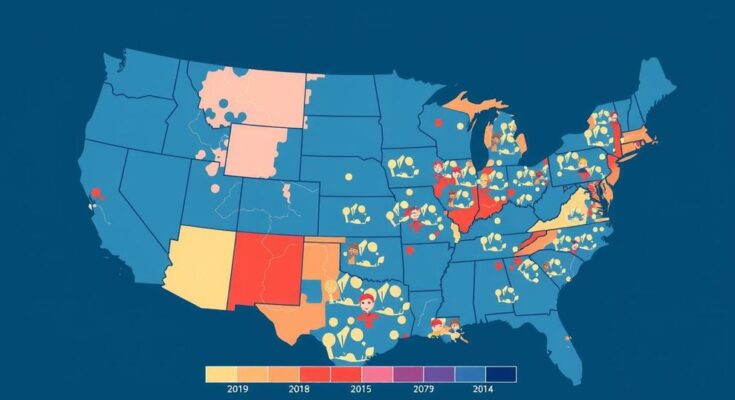Recent polling indicates that Donald Trump leads Kamala Harris by a significant margin among male voters, particularly young men, while he faces declining support from women, especially white women. Despite controversy surrounding his past remarks, Trump has made notable gains with Hispanic-American and African-American men. The political landscape is increasingly defined by gender dynamics, showcasing an evolving split in voter allegiance as the 2024 elections approach.
In the current race for the presidency, a recent New York Times poll indicates that Donald Trump has garnered significant support from male voters, leading his opponent Kamala Harris by 11 percentage points. This male demographic has historically been a stronghold for Trump, particularly among white men, but he has also made notable inroads with Hispanic-American and African-American men. Surprisingly, despite his track record of controversial remarks about minorities, approximately 50% of Hispanic men perceive Trump as sufficiently strong to lead the nation. Additionally, polls suggest that about one in four African American men under 50 support Trump, a striking figure amid his reported history of remarks viewed negatively by many within that community. Trump’s strength among young men is particularly pronounced. Polling indicates that he enjoys a substantial advantage over Harris, obtaining 58% of support from young men compared to her 37%. This shift in loyalty represents a broader trend in which young men have increasingly aligned with conservative views while young women remain predominantly progressive. The allure of Trump’s persona among young males could be attributed to their desire for a representative who eschews societal expectations and speaks plainly. A YouGov study highlights that nearly two-thirds of American men believe their representation in society is insufficient. Moreover, men struggling to conform to conventional masculine ideals may find comfort in Trump’s overt machismo, as they grapple with their feelings of inadequacy. Trump’s campaign strategy appears tailored to appeal to a demographic resonating with his aggressive rhetoric and anti-political correctness stance, which many observe as a direct challenge to the prevailing narrative regarding masculinity in the post-MeToo era. This perception has fostered an environment where some men feel threatened by the advancement of women, with research indicating a substantial percentage believe that women’s progress has been at the expense of men’s standing in society. Conversely, the support for Trump among women, particularly white women, is dwindling. His misogynistic remarks and the contentious Supreme Court decision overturning Roe v. Wade have galvanized many female voters against him. Although Trump claims to advocate for women’s rights through statements such as being their “protector,” these efforts appear to be ineffective, as demonstrated by the shrinking lead Trump holds among white women, which has decreased from seven points in 2020 to just one point in 2024. While male support for Trump demonstrates a pronounced trend toward his favor, female opposition is intensifying in a political landscape sharply defined by gender disparities.
The dynamics of loyalty towards political candidates in the U.S. are notably influenced by gender identities and the evolving political landscape. Recent trends indicate a significant shift in the voting patterns of various demographic groups, particularly males and females, in the context of the upcoming electoral cycle. Understanding these trends is crucial for comprehending the nuances of each candidate’s appeal across different segments of the population. This article explores the factors contributing to the rising support for Donald Trump among men, as well as the declining favor among women in the face of key societal changes and prevailing sentiments.
The current electoral landscape reveals a stark contrast in support for Donald Trump across gender lines. While he successfully consolidates his base among male voters, particularly younger demographics, his appeal to women, especially white women, has significantly declined in light of previous support. As the election approaches, the interplay between these gender dynamics will likely be pivotal in determining the outcome, underscoring the importance of understanding voter sentiment and behavior in contemporary American politics.
Original Source: theconversation.com




